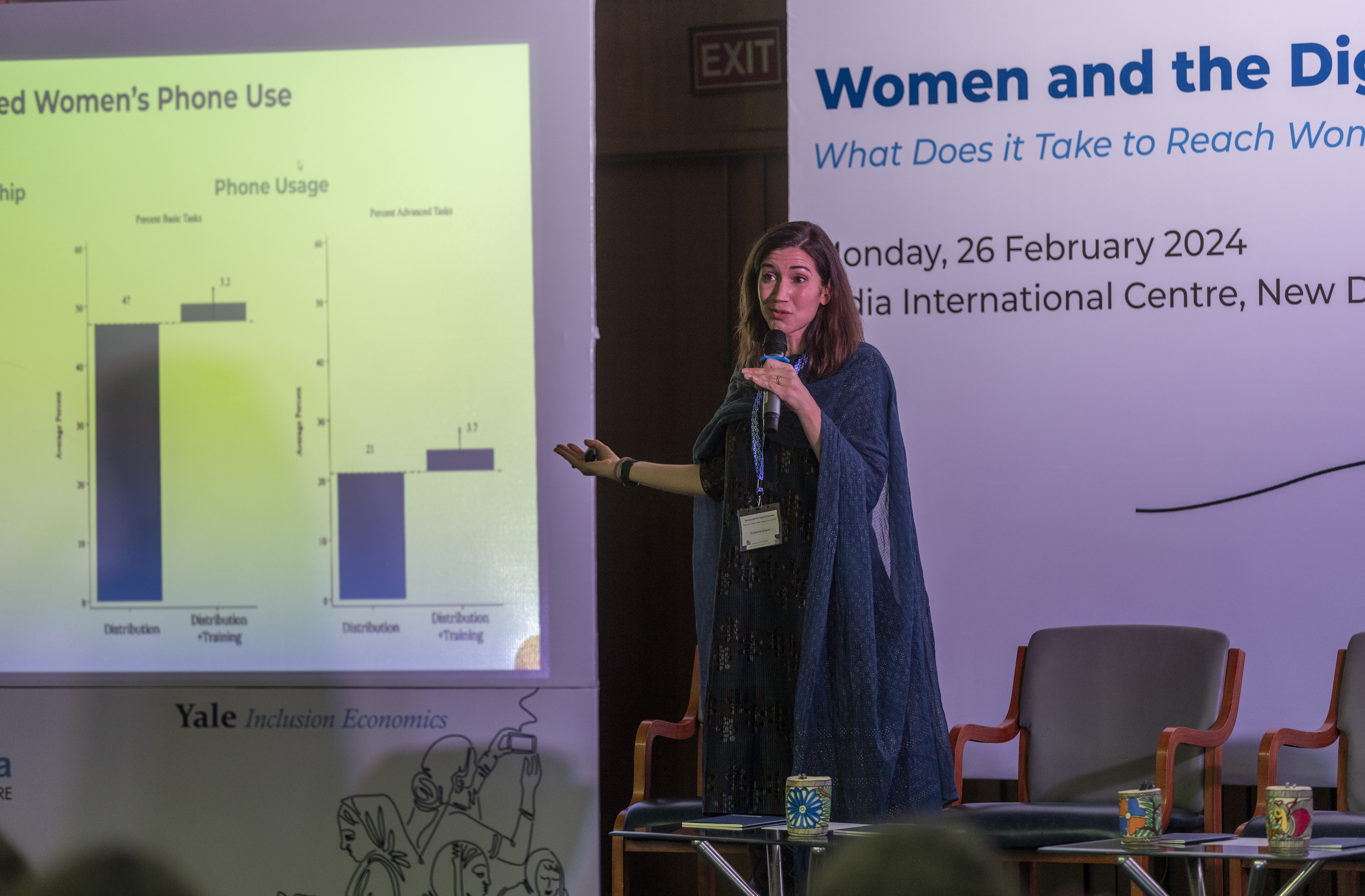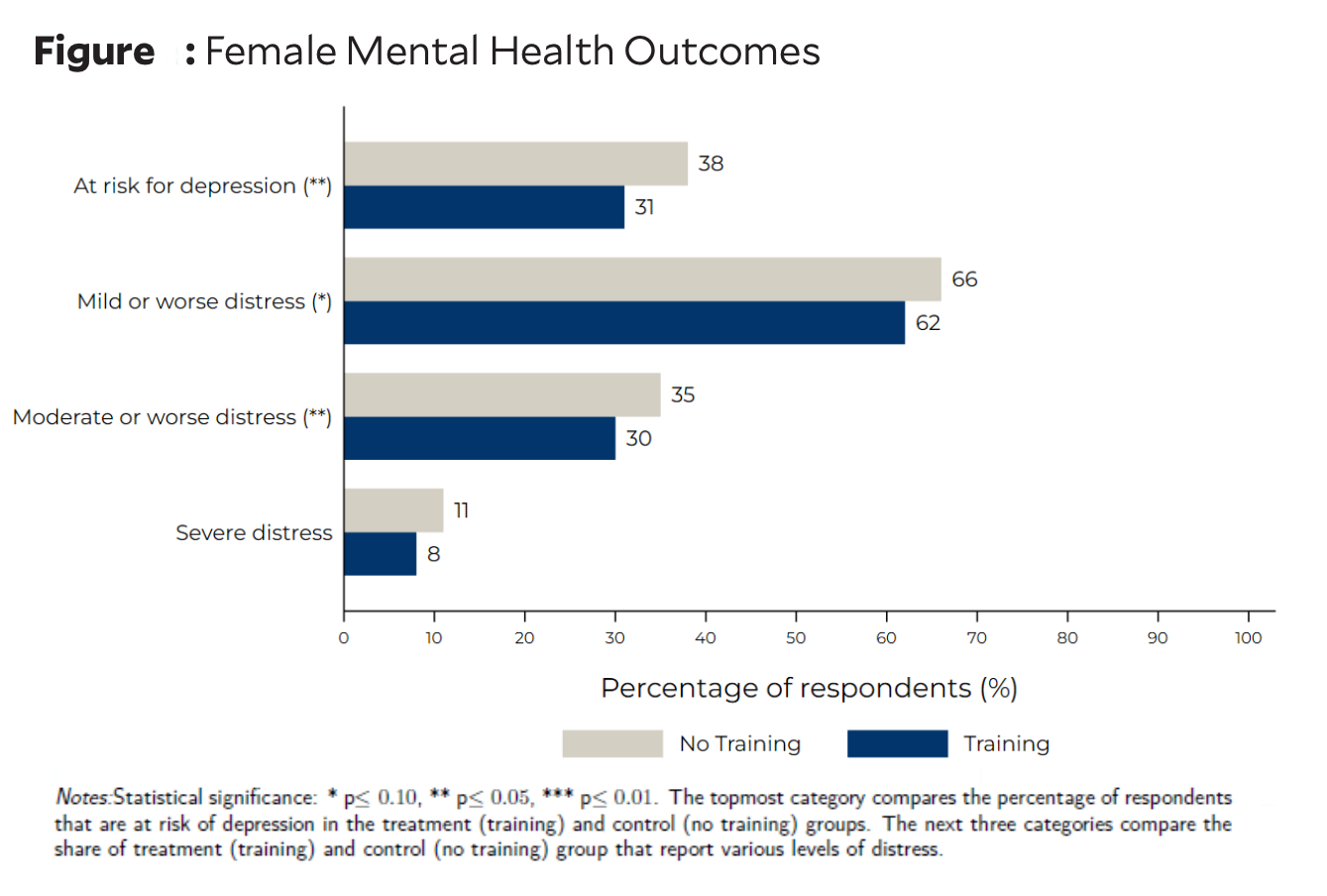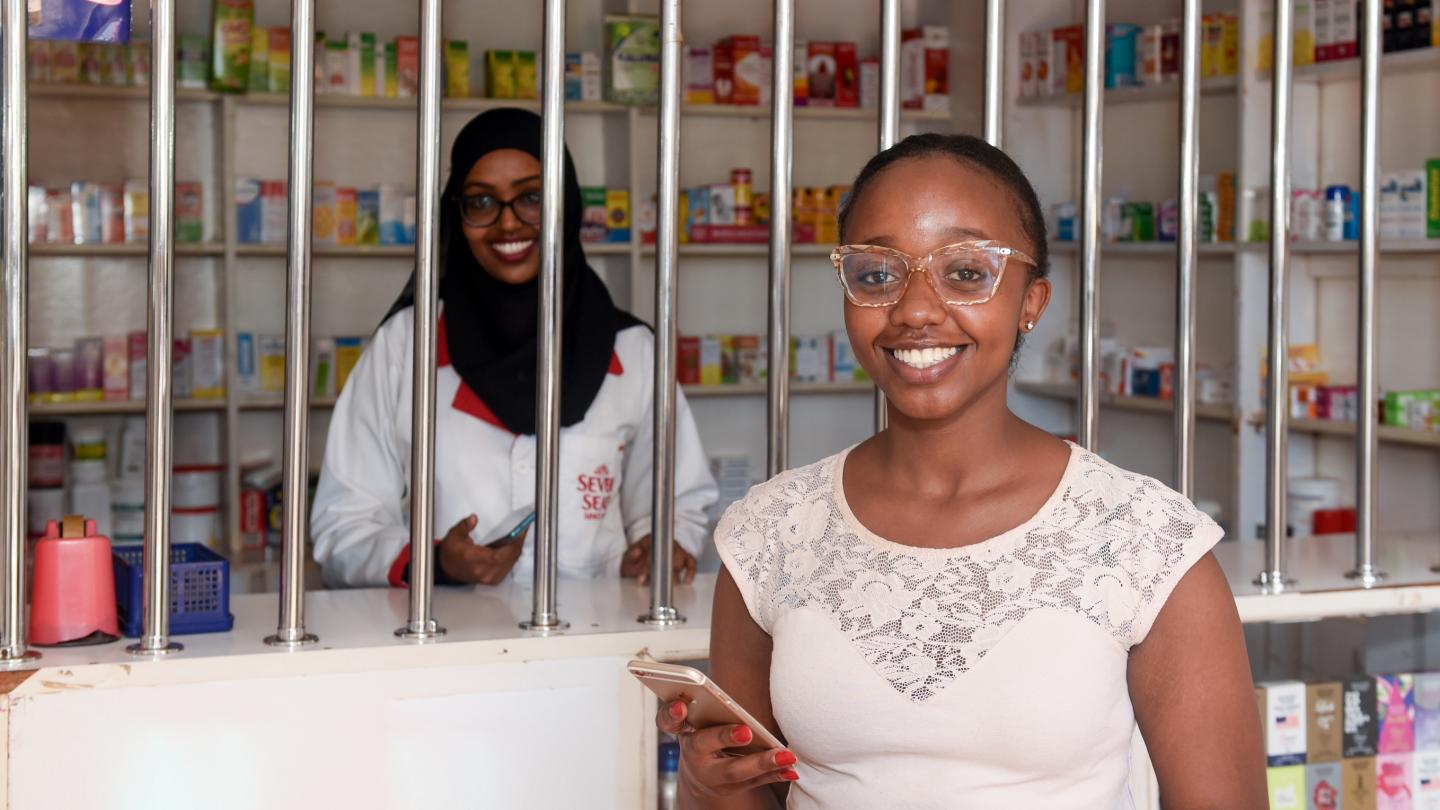Towards Gender Equality Newsletter Issue #2: Closing the Digital Gender Gap

Digital advances do not inevitably include women (women are 19% less likely than men to use mobile internet), and they can sometimes perpetuate discrimination and gender inequality. In this issue we dive into an exciting portfolio of new research on closing digital gender gaps by EGC affiliates, their collaborators, and the broader research community. From examining the employment effects of mobile internet access to exploring the impact of digital (vs. cash) financial disbursement on women-owned microenterprise capital and profits, we feature novel studies that investigate the role of digital interventions in tackling barriers to women's social and economic agency and well-being.
In this newsletter we are also pleased to feature a Yale PhD alumnus and long-time collaborator with EGC affiliates, Gaurav Chiplunkar. Chiplunkar is pushing the frontier of research on gender, labor markets, structural transformation, and the rise of the digital economy through a portfolio of papers covering a wide range of low- and middle-income countries. Additionally, we are excited to announce that a young researcher in this space, Lisa Ho, will be joining us as an EGC/IE postdoctoral associate in Fall 2024. Below, we showcase her job market paper (jointly with Suhani Jalota and Anahita Karandikar), which examines the social and economic implications of flexible digital work arrangements for women in West Bengal.
We also invite you to join us at an upcoming workshop focused on gender and growth gaps in sub-Saharan Africa where the discussion will include a focus on the rise of the digital economy in the region and its gendered implications.

Aishwarya Lakshmi Ratan
EGC Deputy Director
New Research
Resisting Social Pressure in the Household Using Mobile Money: Experimental Evidence on Microenterprise Investment in Uganda (2024)
Riley investigates whether changing the method of microfinance loan disbursement helps female borrowers overcome household sharing pressures and enhance business growth. Comparing cash to digital account disbursement among 3,000 borrowers in Uganda, she finds that women receiving loans digitally see an increase in business capital and profits, particularly among those facing pressure to share money within their households.
Bringing Work Home: Flexible Work Arrangements as Gateway Jobs for Women in West Bengal (2024)
In a field experiment involving 1,670 households in West Bengal, India, participants were offered short-term digital data entry jobs with flexible work arrangements. The paper finds three sets of results: job flexibility boosts job uptake; working from home reduces worker productivity due to interruptions, and – promisingly – flexible jobs act as a gateway to jobs outside the home for women who are initially out of the labor force.
The Employment Effects of Mobile Internet in Developing Countries (2022)
The authors examine the employment effects of 3G mobile internet expansion in developing countries. They find that 3G significantly increases the labor force participation rate of women and the employment rate of both men and women. However, they document a distinct gender dimension in the transition across types of jobs that men and women take up. Internet connectivity enables more women to start small businesses in agriculture and services, and to get wage jobs in the service sector. However, there is also an increase in women filling unpaid agricultural jobs vacated by men for whom 3G coverage has also provided better opportunities.
Featured Researcher: Gaurav Chiplunkar

Gaurav Chiplunkar is Assistant Professor of Business Administration at Darden School of Business, University of Virginia. He studies how digital technology and industrial policy reforms mitigate the labor market barriers faced by women and youth, along with their implications for aggregate productivity and growth.
With Yale EGC affiliate, Penny Goldberg, Gaurav has written about the employment effects of 3G internet rollout in low- and middle-income countries, and about the barriers to women's participation in the workforce and entrepreneurship. Related work with Tatjana Kleineberg has investigated the link between gender barriers, structural transformation, and economic growth across various countries over the last 50 years. For EGC's Gender and Growth Gaps project, Gaurav is currently working with Goldberg and Pamela Torola to analyze the implications of Mexico's 3G internet rollout across an innovative range of labor market outcomes. See Gaurav's website for more information.
"The last decade has seen a rapid rise of digitalization across developing countries. Understanding the role of gender in the digital economy goes beyond inclusivity alone; it is a necessity in navigating the new economic opportunities, complexities, and implications in a digitally driven world.” – Gaurav Chiplunkar
Policy Engagement and Events
Women and the Digital Economy: What Does it Take to Reach Women at the Last Mile? (February 26, 2024, New Delhi, India)

Simone Schaner sharing findings from Inclusion Economics' studies.
This in-person research and policy workshop in Delhi shared research and assessed evidence on policy levers to bridge India’s digital divide and how to close last-mile gender gaps in digital access. The event convened nearly 70 members of government, academia, philanthropy, and private sector organizations.
Researchers from Inclusion Economics began the day by discussing research started seven years ago, which focuses on which gaps exist, why they exist, why they matter, and the potential of two recently tested policy levers in closing digital gender gaps and challenging restrictive gender norms around women’s phone use – also hearing reflections of a policy partner from this initiative. Representatives of four organizations working at the forefront of women’s digital inclusion then presented a range of perspectives on gender norms and phone ownership and use, AI and livelihoods, and digital and financial skills in the informal sector. Finally, policymakers and practitioners joined a panel discussion, highlighting gaps in knowledge and policy relating to digital inclusion for women.
A key featured study at the event was “Hold the Phone: Social and Economic Implications of Improving Women's Agency and Control over Smartphones” (forthcoming) by Barboni, Field, Pande, Rigol, Schaner, and Troyer Moore. Women frequently cite affordability as a key reason they do not own a phone. Can addressing cost constraints close digital gender gaps and allow women to benefit from mobile technology?
To understand this question, the authors examined the impact of a phone distribution program in the Indian state of Chhattisgarh, which provided smartphones and free data to over 2 million low-income women. In addition to assessing the impact of the program, the authors conducted a randomized evaluation to assess whether addressing other constraints to women’s phone use, such as digital literacy, could close digital gender gaps.
Simone Schaner presented early findings from this research, revealing that while the smartphone distribution program initially narrowed the gender gap in smartphone ownership and usage, it did not close digital gender gaps over the longer term. In contrast, a short digital training not only significantly boosted women's smartphone usage two years post-training, but it also improved women’s mental health, likely due to expanded social networks via their phones, as shown in Figure 1 (see research brief for additional detail).

Upcoming event: Gender and Growth Gaps in Sub-Saharan Africa – Research and Policy Dialogue (June 13, 2024, Accra, Ghana)

We invite interested colleagues to join us at this upcoming one-day research and policy workshop. An overview of the program and event objectives is available on the event webpage here, and the program includes a session on ‘The Rise of the Digital Economy’ in the region. You can RSVP to attend the event here.
Additional Resources
The Platform Livelihoods Project: Working, Trading, Renting, and Creating in a Digital Age
The Platform Livelihoods Project explores the experiences of individual workers and sellers as they rely on digital platforms to earn a living. Coordinated by Caribou Digital, this extensive study features contributions from over 40 authors. Published earlier this year, Chapter 8 of the book focuses on women.
Digital Platforms and Women's Economic Empowerment
This new initiative, led by Farzana Afridi at the Indian Statistical Institute (ISI), Delhi, seeks to harness digital technology to address multiple constraints on female labor force participation and improve women’s labor market outcomes.
Gendered Nature of Digital Inequality: Evidence for Policy Considerations
A background paper submitted to UN Women by Research ICT Africa in 2022.
Upcoming launch of GSMA’s Mobile Gender Gap Report 2024
GSMA will launch the Mobile Gender Gap Report 2024 on May 15th 2024. The report will provide valuable updated information on the status of basic measures of gender gaps in mobile access in low and middle income countries.
BRAC BIGD Request for Proposals on Women’s Economic Empowerment and Digital Finance
In their fourth Request for Proposals, the BRAC Institute of Governance and Development (BIGD) is inviting research proposals for large and small grants on the theme of how digital financial services affect women’s economic empowerment. The submission deadline is May 14th, 2024, 23:59 Bangladesh Standard Time.
Retail Finance Distribution Initiative - Call for Applications
The Retail Finance Distribution (ReFinD) research initiative of the Institute of Statistical, Social and Economic (ISSER) at University of Ghana, is calling for applications for its third round of sub-grants for research in retail finance distribution. The framework paper for the call includes a gender lens; there are five categories of sub-grants. The submission deadline is May 17th, 2024.